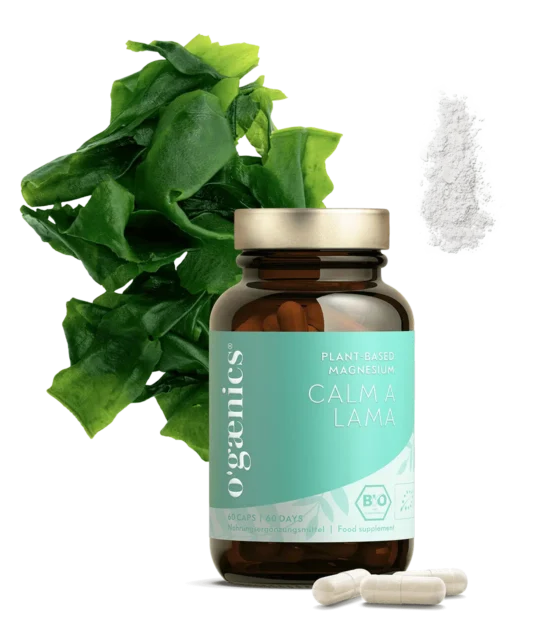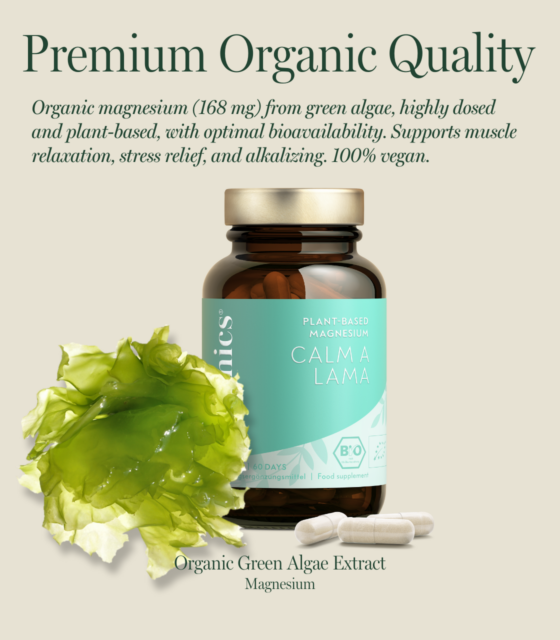Magnesium deficiency affects many women, but usually unnoticed.
Magnesium deficiency could be the key to your vitality, balance and overall well-being. Magnesium is your hormone helper, your bones’ best friend, a supporter of muscles, and more – this miracle mineral is everything. Learn more about the importance of magnesium and how to recognize a magnesium deficiency here.
If you want to know even more reasons why you should love the mineral magnesium, then you should definitely read the article “The magnesium effect: 9 reasons why you should love the mineral”. This article delves into the many health benefits of magnesium and gives you a comprehensive look at its positive effects on our bodies. Combining information from both articles can help you optimize your health and wellness.
Magnesium: The basics
Magnesium is indispensable for our health because it is involved in over 600 vital enzymatic processes. We cannot produce it ourselves and must consume it daily through our diet or through supplements (e.g., Ogaenics Calm A Lama Plant-Based Magnesium).
Magnesium homeostasis ensures that magnesium levels in the blood and body cells remain within a narrow range to maintain normal body function. This occurs by regulating the absorption of magnesium from food in the intestines, the excretion of magnesium by the kidneys, and the storage of magnesium in bones and tissues. That’s why it takes a long time for a magnesium deficiency to become visible and noticeable.
Symptoms of magnesium deficiency
The fatal thing about magnesium deficiency is that it doesn’t cause any obvious symptoms at first in the short term. Your body can compensate for a deficit for a very long time through magnesium homeostasis.
A magnesium deficiency (hypomagnesemia) can cause muscle cramps, cardiac arrhythmias, fatigue, and other symptoms. However, there are very many diffuse symptoms that can indicate a magnesium deficiency:
- Brain Fog
- Sleep disorders
- Headache/migraine
- Irritability
- Hypertension
- Loss of appetite
- Flatulence
- Acid reflux
- Adrenal exhaustion
- Anxiety and panic attacks
- Night grinding of teeth
- Elevated cholesterol
- Hypoglycemia
- Digestive problems
- Inflammations
- IBS
- PMS
- Caries
- “Restless Legs”
That’s because every cell in your body needs magnesium to function.
How much magnesium do you need daily?
Learn how much magnesium you need daily to avoid developing a magnesium deficiency. Simple dietary changes or supplementation can help meet your magnesium needs.
The reference value for magnesium in the EU is 375 milligrams per day. For comparison: 100 grams of spinach contain about 58 milligrams of magnesium.
However, you don’t necessarily need to take a blood test to determine a magnesium deficiency. If you know some of the symptoms about you, you should improve your magnesium intake.
The best sources of magnesium
Foods rich in magnesium include:
| Foodstuffs | Magnesium content in mg/100 g |
| Pumpkin seeds | 402 |
| Sunflower seeds | 395 |
| Cocoa beans | 389 |
| Linseed | 350 |
| Sesame | 347 |
| Cashew nuts | 255 |
| Pine nuts | 235 |
| Almonds | 220 |
| Peanuts | 182 |
| Millet | 170 |
Source: Raw Food Wiki
Drinking water or mineral water can also be a significant source of magnesium. However, this varies depending on the location and water source. Therefore, before buying, check the laboratory values on the label and make a wise purchase decision.
If you find it difficult to meet your needs through diet alone, you can also turn to a good dietary supplement.
Factors leading to magnesium deficiency
Learn why magnesium deficiency is so prevalent today and what factors contribute to it, such as inadequate dietary habits, stress, pregnancy and medications.
In principle, nowadays anyone can have a magnesium deficiency, because even our food is already deficient in magnesium. Cooking food also reduces the magnesium content of our diet by an average of 60-70 percent compared to raw or uncooked foods.
Chronic stress can also lead to magnesium deficiency, as your body excretes more magnesium in stressful situations and it is then no longer available. Read here to find out exactly what stress does to your digestive system – and how you can counteract it:
👉 What stress really does to your gut – and how you can counteract it
Even if you eat a ketogenic or low carb diet, you are at risk of magnesium deficiency in the long run.
During pregnancy and breastfeeding, your need for magnesium increases due to the increased physical demands and growth of the baby. If your magnesium consumption does not grow along with it, magnesium deficiency is imminent.
Certain factors also contribute to the possibility that you may be unknowingly at risk for magnesium deficiency.
These are the main magnesium robbers
1. the birth control pill
2. hormone replacement products during menopause.
3. asthma drugs
4. cocaine
5. digitalis (in medicines for the treatment of heart disease)
6. diuretics (used for high blood pressure).
7. fluoride in toothpaste and drinking water binds magneium
8. insulin
9. nicotine
10. proton pump inhibitors (for excessive gastric acid).
11. statins (for elevated cholesterol)
12. tetracyclines and other antibiotics
13. High dose vitamin D consumes magnesium
Is it possible to overdose magnesium?
Simply put: No. Magnesium deficiency is common, but for dosage your body has a natural backup mechanism. If you take in too much magnesium, your body will get rid of the excess through the intestines via diarrhea. This makes magnesium one of the safest nutrients you can take. This safeguard mechanism has evolved through evolution.
What magnesium is the best for the body
Magnesium occurs in plants in the form of magnesium ions (Mg²⁺). These ions are an essential mineral for plants and play an important role in various biochemical processes, including photosynthesis. In plants, magnesium ions are particularly concentrated in chlorophyll-containing cells because magnesium is essential for photosynthesis.
Magnesium from plant sources is more readily available to the body and therefore more effective at replenishing a magnesium deficiency than most synthetic forms such as magnesium oxide, magnesium citrate or magnesium sulfate. The natural compound can be absorbed and used more efficiently by the body.
Therefore, for Ogaenics Calm A Lama Plant-Based Magnesium, the magnesium is derived from organic green algae extract, which means it is purely plant-based. Plant magnesium also contains other important nutrients and phytochemicals that may be beneficial to health.
Especially if you have had digestive problems, such as diarrhea, with synthetic magnesium supplements, the herbal magnesium will do you good because it is better tolerated.
-
Bestseller
Calm A Lama
Plant-based organic magnesium from premium organic green algae extract for muscles and nerves44,90 €1.076,74 € / kg
-
Set 2x Calm A Lama | Plant-Based Bio-Magnesium
2-pack (=4-month supply) of organic magnesium from premium green algae extract for effective regeneration84,90 €89,80 €1.076,74 €1.017,99 € / kg






 No products in the cart.
No products in the cart.